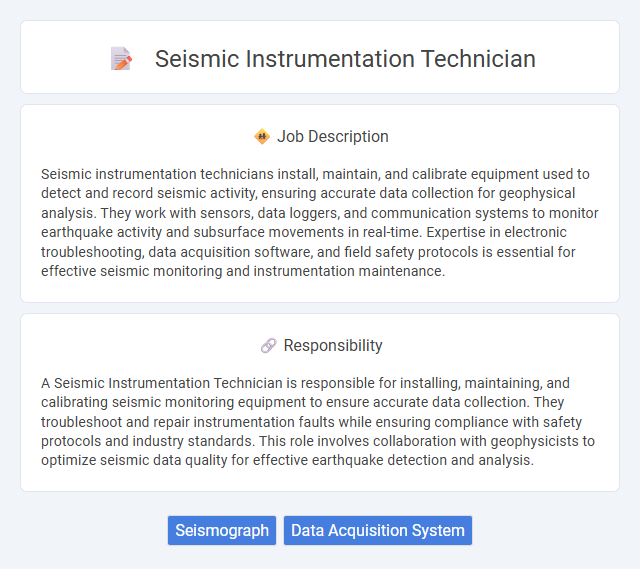
Seismic instrumentation technicians install, maintain, and calibrate equipment used to detect and record seismic activity, ensuring accurate data collection for geophysical analysis. They work with sensors, data loggers, and communication systems to monitor earthquake activity and subsurface movements in real-time. Expertise in electronic troubleshooting, data acquisition software, and field safety protocols is essential for effective seismic monitoring and instrumentation maintenance.
Seismic instrumentation technician roles may be suitable for individuals with strong technical skills, attention to detail, and the ability to work in challenging outdoor environments. People who thrive in physically demanding conditions and have a penchant for problem-solving might find this career fitting. Those prone to discomfort with remote locations or irregular hours may find the job less suitable.
Qualification
A Seismic Instrumentation Technician requires proficiency in installing, maintaining, and calibrating seismic monitoring equipment in diverse environments. Candidates typically need a technical diploma or degree in geophysics, engineering, or related fields, with hands-on experience in data acquisition systems and sensor technology. Strong analytical skills and knowledge of seismic software ensure effective data collection and troubleshooting in field operations.
Responsibility
A Seismic Instrumentation Technician is responsible for installing, maintaining, and calibrating seismic monitoring equipment to ensure accurate data collection. They troubleshoot and repair instrumentation faults while ensuring compliance with safety protocols and industry standards. This role involves collaboration with geophysicists to optimize seismic data quality for effective earthquake detection and analysis.
Benefit
Seismic instrumentation technicians likely experience significant benefits such as competitive salaries and opportunities for fieldwork in diverse geological settings. There is a strong probability that their skills contribute to essential data collection critical for earthquake prediction and structural safety, enhancing job satisfaction. Furthermore, career advancement prospects may be favorable due to the specialized technical expertise required in this field.
Challenge
Seismic instrumentation technician roles likely involve challenging environments where precision and attention to detail are crucial for accurate data collection. The job may require troubleshooting complex equipment under varying field conditions, demanding strong problem-solving skills and adaptability. These challenges probably contribute to continuous learning and professional development opportunities in the seismic data acquisition industry.
Career Advancement
Seismic instrumentation technicians specialize in installing, maintaining, and troubleshooting seismic monitoring equipment used in geophysical studies and earthquake detection. Career advancement opportunities include progressing to senior technician roles, project management positions, or transitioning into geotechnical engineering and seismic data analysis. Gaining certifications in advanced seismic technologies and expertise in data interpretation significantly enhances promotion prospects within the energy, construction, and environmental sectors.
Key Terms
Seismograph
Seismic instrumentation technicians specialize in installing, calibrating, and maintaining seismographs to accurately measure ground motion during earthquakes. They ensure precise data acquisition by troubleshooting sensor arrays and optimizing signal processing systems for real-time monitoring. Proficiency in geophysical software and interpreting seismic waveforms enhances the reliability of seismic hazard analysis and earthquake prediction efforts.
Data Acquisition System
Seismic instrumentation technicians specialize in installing, maintaining, and calibrating Data Acquisition Systems (DAS) that capture seismic data from sensors and convert it into digital signals for analysis. Their expertise ensures accurate real-time monitoring of seismic activity by troubleshooting hardware and software components within the DAS framework. Proficiency in handling geophysical instruments and data logging equipment is critical for optimizing seismic data integrity and supporting earthquake research or resource exploration.
 kuljobs.com
kuljobs.com